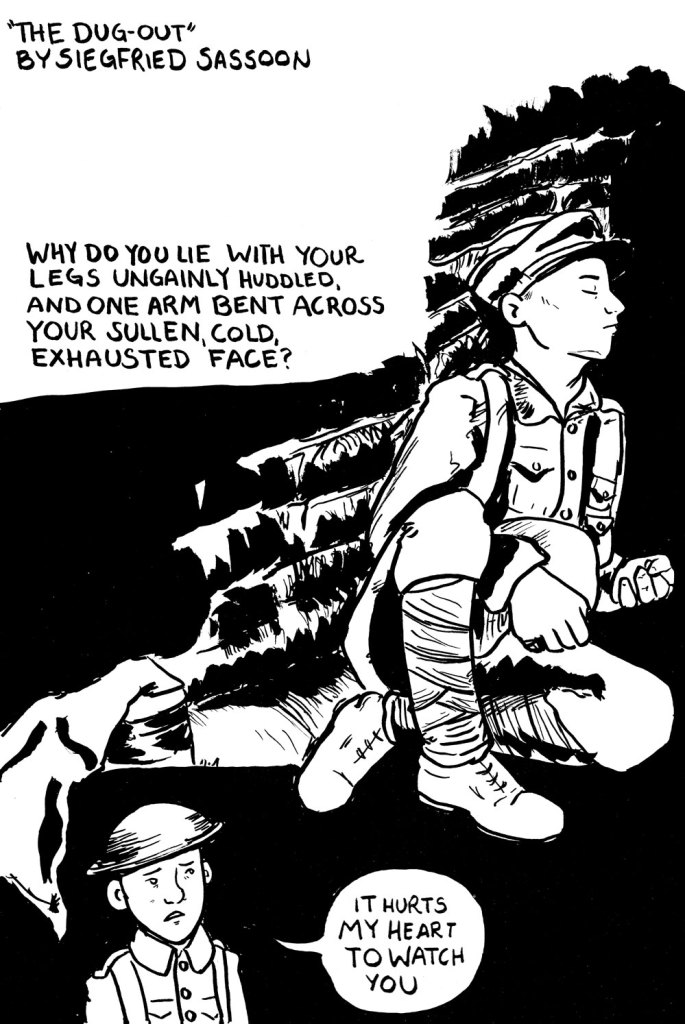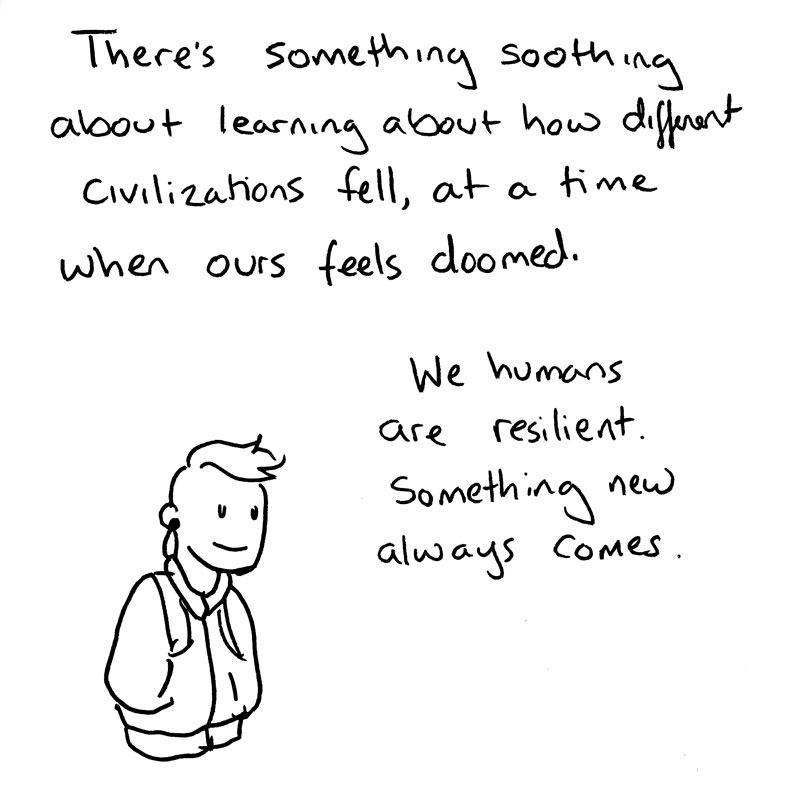Ned Barnett has made a series of graphic memoirs in recent years like No Rest for the Anxious, Hallo Spaceboy and last year’s Dreamers of the Day, which is part autobiographical journey and part exploration of the life of T.E. Lawrence. In these books and in short comics for a variety of outlets and anthologies, Barnett has shown a great talent for historical detail and capturing those small human elements that are often glossed over, giving readers a different and deeper look at the people and the era in the comics.
More recently Barnett made Social Distancing – Life in the COVID-19 Pandemic, which ran on Line Webtoon. From day to day the comic has taken different forms and approaches, but it is very consciously an effort to make a document of these times, of the elements of this crisis that are unique and that have precedent. He and I exchanged e-mails recently about the pandemic, T.E. Lawrence and thinking about what’s next.

To start, how did you come to comics?
I love words and I love pictures – comics is the perfect marriage of the two as a storytelling medium. I grew up reading newspaper comics, editorial cartoons (because I couldn’t get enough), and the comics section of Disney Adventures. I started reading Silver Age Marvel Comics in high school, and web comics in college. I read a lot more while I was living in Edinburgh for my MSc. I started making comics about three years ago.

So why were you in Edinburgh and what did you read while you were there?
I lived in Edinburgh for 18 months while doing my postgraduate master’s degree in design and digital media. While I was there, I developed a ritual of going to the central library and checking out comics. I read a lot of Alan Moore, particularly League of Extraordinary Gentlemen. When my husband and I started dating, he got me into reading Grant Morrison’s stuff, and indie and small press comics, like Fart Party and American Elf.
After you started reading them, what was it that prompted you to start making comics?
My two loves have always been telling stories and drawing pictures – comics are the perfect marriage of the two. I started making them in earnest about three years ago, and haven’t looked back.

How did you end up making a COVID-19 webcomic?
I wanted to create a record of what was happening during COVID-19 because it felt important. I’m a historian by inclination rather than training, and wanted to make a first person account exists for future researchers. Sharing it on WebToon meant that a back up existed in case anything happened to the originals. I intend to donate the originals to MIT Libraries for their COVID collection.
Especially now you’re looking back on it, how did the comic change while you were doing it?
I had perceived of it to be something more personal, but as I drew and shared, it grew into something more akin to my regular comics – taking broad events and subject matter and weaving it all together.

How much of those changes was simply due to circumstances changing? You’re in Boston and things were bad for a while. People were scared, and it is a very different thing right now.
I’m in Cambridge, which is just on the other side of the Charles River from Boston. It was scary and there was – and is – so much uncertainty. The changes in how I approached the comic came from my attempts to understand what was going on, and searching out answers from around the country and the world.
Why did you decide to end the comic at the end of May?
I burnt myself out – I was working at a pace that wasn’t sustainable, especially given how long COVID-19 has lasted. It wasn’t a conscious decision, but it was the one I needed to make. My hand was forced by a deadline for another comics project, and I found that once that was over returning to Social Distancing was not in the cards.

How therapeutic was making the comic? Or if not therapeutic, then it was good to have something to do?
I process a lot of my experiences and emotions through making comics. Social Distancing gave me a thing I could control during the early days of COVID-19, and let me craft a narrative out of it. I do miss it, especially as we sit at month six and things are starting to feel a bit hopeless and frustrating.
You made No Rest for the Anxious, which was a collection of your zines about life with generalized anxiety disorder. Do you think having lived with anxiety for so long, now that we’re at a moment where almost everyone has anxiety, helped you to handle this moment better than some people?
I don’t know if I’m better at handling anxiety than most. I’m fortunate that I’m in therapy and on medication, and those have not been disrupted. Therapy is now teletherapy, and my medication is delivered by post. However, I have lost some of my coping mechanisms, like having events and travel to look forward to and the gym. But the pandemic has been a masterclass in adapting.

According to your website, your work “focuses on heroes, health, and history. He is interested in T.E. Lawrence, the Arab Revolt and the First World War.” Are they simply your interests and you like making comics, so you make comics about these subjects?
I realized a couple years ago that all of the comics I make fall into at least one of the “heroes, health and history” categories. They are broad, and in many cases my work overlaps into at least two. I make comics about T.E. Lawrence, the Arab Revolt, and the First World War because they fascinate me. Making comics is incredibly time-consuming. I want to spend my time with what I love.
What do you see as the relationship between telling personal stories and making historical and nonfiction comics?
All stories are personal. Some are more obviously personal than others, such as my comics about living with mental illness, or COVID-19. But my historical and biographical works are just as personal as my memoir comics. The study of history and making comics both inform how I experience the world, so they are two sides of the same coin.

Will you ever make more Kitchen Witches?
Might do! Mairi and Valerie are really fun to write and draw, though I don’t have plans to return to their story at the moment.
You recently made two comics, Better Off Ned. Are you planning on making more?
I am! I’ve had quick-turn-around comics work pop up, so I’ve put it on the back burner. I wrote a number of scripts that are just waiting to be drawn.
Especially after Social Distancing, has your thinking about comics, what you want to do or what they can be for you, changed this year?
If anything, the COVID comics have solidified that non-fiction comics is where I want to be. I love how comics convey information and make difficult subjects – like explaining health information or history – easier to understand and digest.

